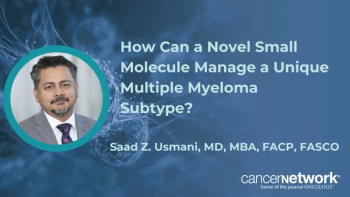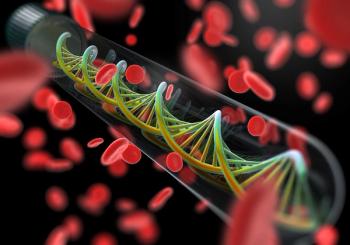
- ONCOLOGY Vol 14 No 3
- Volume 14
- Issue 3
Excellent Tolerance of Rituxan When Given After Mitoxantrone-Cyclophosphamide: An Effective and Safe Combination for Indolent Non-Hodgkin’s Lymphoma
Rituximab (Rituxan) may be an ideal agent for combination with chemotherapy in patients with extensive indolent lymphoma because of non–cross-resistant efficacy and differential toxicity. However, lethal complications have occurred. Furthermore
Rituximab (Rituxan) may be an ideal agent for combination with chemotherapy in patients with extensive indolent lymphoma because of noncross-resistant efficacy and differential toxicity. However, lethal complications have occurred. Furthermore, the potential for synergy with chemotherapy has been documented.
A total of 24 patients with indolent B-cell non-Hodgkins lymphoma (NHL) have been treated with a novel, three-drug combination: cyclophosphamide (Cytoxan, Neosar), mitoxantrone (Novantrone), and rituximab. Patient characteristics included: median age, 60 years (range, 36 to 72 years); follicular histology, 13 patients; small lymphocytic lymphoma/chronic lymphocytic leukemia, 6 patients; lymphoplasmacytic, 4 patients; marginal zone, 1 patient. All 24 patients had stage III or IV disease. Of the 24 patients, 10 had received prior treatment with one to three courses of chemotherapy (including alkylating agents).
Patients first received cyclophosphamide, 800 mg/m², and mitoxantrone, 8 mg/m² intravenously [IV] on day 1, every 3 weeks for two cycles. Subsequently, patients received rituximab, 375 mg/m², followed by mitoxantrone, 8 mg/m², every 2 weeks for four cycles. The regimen, particularly rituximab, was extremely well tolerated.
Only 2 of 22 assessable patients experienced grade 1 or 2 infusion-related toxicity (mild chills, fever of 37.9 °C, or rash) during the first rituximab treatment (1 patient had received rituximab previously). Grade 4 neutropenia was noted at some point in 14 patients, who were offered granulocyte-macrophage colony-stimulating factor (GM-CSF [Leukine, Prokine]) support for improvement of neutropenia and, possibly, enhancement of antibody-dependent cellular cytotoxicity (ADCC). No infections were noted. Alopecia was minimal.
Of 21 evaluable patients, 1 had a transient partial response (PR), 2 had a sustainable PR, and 17 achieved a complete response (CR) after a median follow-up of 12 months. Hence, the overall response rate is 95%. The objective responses per subtype are: follicular, 11/11; small lymphocytic lymphoma, 4/5; plasmacytic, 4/4; and marginal zone, 1/1. Except for two patients, all responders remain in remission. Molecular remissions were noted in three of five tested patients.
CONCLUSION: We conclude that the cyclophosphamide-mitoxantrone-rituximab regimen is effective and extremely well tolerated. Furthermore, rituximab-related morbidity has not been observed.
Articles in this issue
almost 26 years ago
FHIT Gene, Smoking, and Cervical Canceralmost 26 years ago
IOM Medical Error Estimates Questioned, But Legislation Consideredalmost 26 years ago
Less Toxic Therapies for Hodgkin’s Disease May Reduce Secondary CancersNewsletter
Stay up to date on recent advances in the multidisciplinary approach to cancer.





































